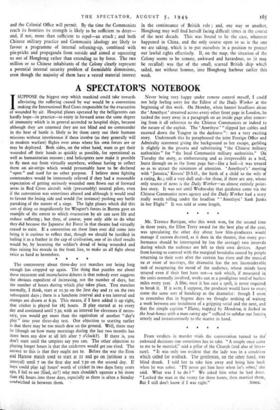The controversy about three-day test matches not being long enough
has cropped up again. The thing that puzzles me about these recurrent and inconclusive debates is that nobody ever suggests the obvious expedient of increasing, not the number of days, but the number of hours during which play takes place. Test matches normally, I think, start at 11.30 on the first day and it on the two subsequent days ; there is a luncheon interval and a-tea interval and stumps are drawn at 6.3o. This means, if I have added it up right, that cricket is played for in hours. If play started at so every day and continued until 7.30, with an interval for elevenses if neces- sary, you would get more than the equivalent of another "day's play " into your three-day test. One objection to starting earlier is that there may be too much dew on the ground. Well, there may be (though on how many mornings during the last two months has there been any dew at all left after 7 o'clock?). If there is, you don't start until the umpires say you can. The other objection to playing longer hours is that the cricketers would get too tired. The answer to this is that they ought not to. Before the war the Eton and Harrow match used to start at II and go on (without a tea interval) until 7 on the first day and 7.30 on the second day. If boys could play sal hours' worth of cricket In two days forty years ago, I fail to see (Gad, sir!) why men shouldn't squeeze a bit more than ifil hours into three days, especially as there is often a Sunday sandwiched in between them.


































 Previous page
Previous page